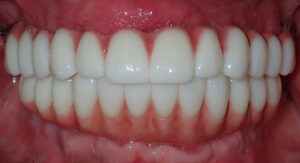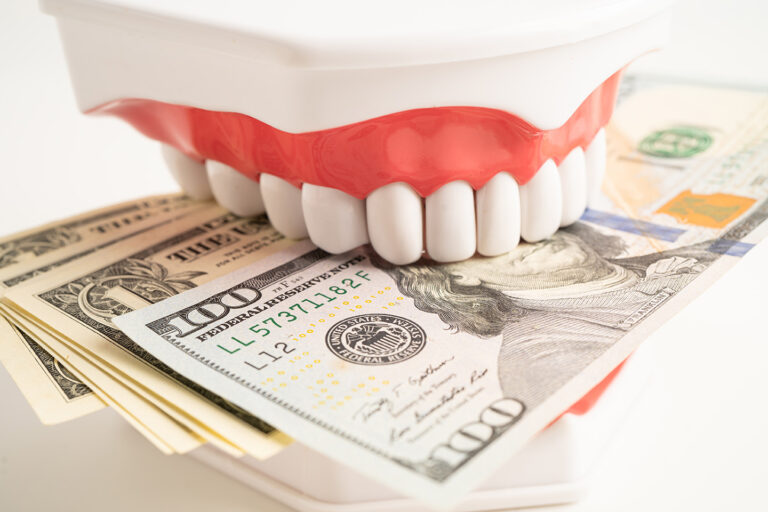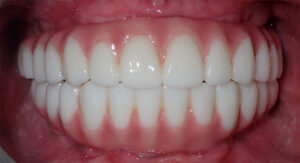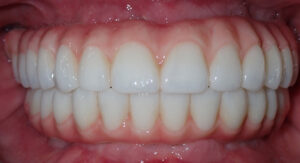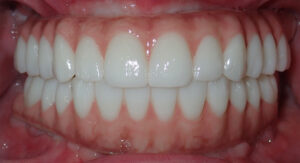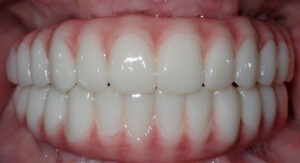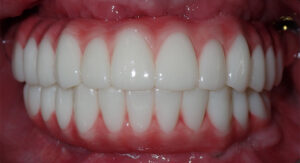Complete dental implants provide a permanent, functional, and natural-looking solution for replacing all teeth in an arch, but many patients hesitate when they ask: How much are complete dental implants compared to other options like dentures or bridges? Understanding cost differences, long-term value, procedural details, and financing options can turn uncertainty into confidence. This article defines complete dental implants, breaks down expenses, compares implants with dentures and bridges, explores investment benefits, outlines payment solutions, highlights Dr. Kaplansky’s expertise, and explains next steps toward a lasting smile.
For patients seeking comprehensive guidance on full-arch restorations, explore Dr. Kaplansky’s advanced solutions on our “Dental Implants” page.
What Are Complete Dental Implants and How Do They Work?
Complete dental implants replace an entire arch of missing teeth by surgically placing titanium or zirconia posts into the jawbone, connecting abutments, and attaching a fixed prosthesis to restore chewing, speech, and aesthetics in a single comprehensive procedure. This method merges oral surgery and prosthodontics to deliver a stable, long-lasting restoration that mimics natural tooth function and appearance.
What Are the Main Parts of a Complete Dental Implant?
Implant Post
- Material:Titanium or zirconia
- Purpose:Anchors securely into the jawbone to allow for osseointegration
Abutment
- Material:Titanium alloy or zirconia
- Role:Serves as the connector between the implant post and the final crown or bridge
Prosthesis
- Type:Full-arch fixed bridge
- Material:Porcelain-fused-to-metal or monolithic zirconia
Together, these components replicate the natural tooth structure. They restore chewing ability, support proper function, and provide a natural look while encouraging biological integration for lasting stability.
How Does Osseointegration Ensure Implant Stability?
Osseointegration describes the process by which living bone fuses to the implant surface, creating a rigid, load-bearing connection. This biological mechanism involves:
- Bone Remodeling → Osteoblasts deposit new bone around the implant surface
- Structural Integration → Direct contact between bone and implant microthreads
- Functional Loading → Posterior chewing forces stimulate bone density and strength
Osseointegration and Implant Success
Osseointegration, the process by which a dental implant fuses with the jawbone, is critical for long-term implant success. Studies show that direct contact between bone and the implant surface, along with functional loading, promotes bone density and strength, leading to high success rates and durability.
Branemark, P.I., et al., Osseointegrated implants in the treatment of the edentulous jaw. Scandinavian Journal of Plastic and Reconstructive Surgery (1977)
This research supports the article’s explanation of how osseointegration ensures implant stability and longevity.
What Types of Complete Dental Implants Are Available?
Complete dental implant solutions vary to meet anatomical and budgetary needs. Common options include:
- All-on-4 Implants → Four implants support a full-arch prosthesis, reducing surgical sites and cost
- All-on-6 Implants → Six implants distribute forces more evenly for enhanced stability
- Traditional Full Arch → Individual implants at each tooth site for maximum customization
- Zirconia Implants → Metal-free posts offering superior aesthetics and biocompatibility
- Zygomatic Implants → Longer implants anchored in the cheekbone for severe bone loss
How Much Do Complete Dental Implants Cost?
Complete dental implants span a wide price range because they combine multiple surgical and restorative steps into a full-arch solution. Understanding average costs and driving factors helps patients evaluate options clearly.
What Is the Average Price Range for Full Mouth Dental Implants?
Entity | Attribute | Value Range |
All-on-4 Full Arch | Estimated Cost | $20,000 – $30,000 |
All-on-6 Full Arch | Estimated Cost | $25,000 – $35,000 |
Traditional Full Arch | Estimated Cost | $30,000 – $45,000 |
Monolithic Zirconia Arch | Estimated Cost | $35,000 – $50,000 |
Zygomatic Implant Arch | Estimated Cost | $40,000 – $60,000 |
Cost Analysis of Dental Implants
The cost of complete dental implants varies widely based on factors such as the number of implants, materials used, and additional procedures required. For example, the cost of All-on-4 full arch implants typically ranges from $20,000 to $30,000, while traditional full arch implants can cost between $30,000 and $45,000.
Goodacre, C.J., et al., Clinical complications with implants and implant prostheses. The International Journal of Oral & Maxillofacial Implants (2003)
This citation provides context for the cost differences between various types of complete dental implants, as discussed in the article.
How Do Specialized Implants Like Zirconia and Zygomatic Affect Cost?
Specialized implant materials and anchorage sites influence fees:
- Zirconia Implants → Higher laboratory and material costs due to custom milling and biocompatibility → + 10–15 percent
- Zygomatic Implants → Advanced surgical expertise and longer posts → + 20–30 percent
- Hybrid Approaches → Combining All-on-4 with zygomatic posts in the upper arch for severe bone loss → Variable
What Additional Procedures Influence the Total Cost?
Beyond implant placement and prosthetic fabrication, ancillary procedures may apply:
- Bone Grafting → Augments deficient bone → $500 – $3,000 per site
- Sinus Lift → Elevates sinus membrane for upper-arch implants → $1,500 – $4,000
- Tooth Extractions → Removes remaining roots or non-viable teeth → $150 – $500 per tooth
- Sedation or General Anesthesia → Ensures patient comfort → $500 – $1,200
How Does Location and Dentist Expertise Impact Pricing?
Geographic and provider factors shape cost structures:
- Regional Variations → Urban areas command higher facility and staffing costs than rural practices
- Specialist Expertise → Board-certified implantologists often have higher fees justified by outcomes and advanced certifications
- Technology Investment → Practices utilizing 3D imaging and guided surgery incur equipment costs reflected in treatment pricing
Choosing an experienced clinician like Dr. Kaplansky in the Buffalo NY region balances competitive rates with the assurance of specialized training and cutting-edge technology.
How Do Complete Dental Implants Compare to Dentures in Cost and Benefits?
When evaluating tooth replacement, patients often weigh complete implants against conventional dentures. Comparing expenses and functional outcomes clarifies long-term value.
What Are the Cost Differences Between Implants and Dentures?
Entity | Attribute | Value |
Removable Full Dentures | Initial Cost | $1,500 – $4,000 |
Implant-Supported Dentures | Initial Cost | $10,000 – $20,000 |
Complete Dental Implants | Initial Cost | $20,000 – $50,000 |
Although dentures offer a lower upfront investment, they require periodic relines, replacements every 5–10 years, and may incur adhesive and repair fees over time.
How Do Implants and Dentures Differ in Stability and Comfort?
Complete implants anchor prostheses directly to bone, eliminating slippage and sore spots. Dentures rest on soft tissue and often shift, compromising chewing efficiency and patient confidence. Implant stability restores up to 95 percent of natural chewing force, while dentures typically deliver only 25–30 percent.
What Is the Impact on Jawbone Health for Implants vs. Dentures?
Dentures can accelerate bone resorption through sustained pressure on the ridge. In contrast, implants transmit chewing loads to the bone, stimulating remodeling and preventing atrophy. Maintaining bone density preserves facial structure, reducing the need for future grafting procedures.
How Do Maintenance and Longevity Compare?
- Complete Implants → Routine hygiene, annual checkups, potential crown refinishing → 20+ years of service with proper care
- Dentures → Daily soaking, adhesive application, professional relining every 2–3 years → 5–10 years before replacement
How Do Complete Dental Implants Compare to Dental Bridges?
Dental bridges replace limited gaps by anchoring to adjacent teeth, but full-arch needs often exceed bridge capacity. Understanding cost and biological impact clarifies the optimal approach.
What Are the Cost Differences Between Implants and Bridges?
Entity | Attribute | Value |
Traditional 3-Unit Bridge | Initial Cost | $3,000 – $5,000 |
Implant-Supported Bridge | Initial Cost | $5,000 – $8,000 |
Complete Dental Implants | Initial Cost | $20,000 – $50,000 |
Bridges require replacement every 10–15 years, while implants often outlast 20 years, balancing higher initial investment with extended durability.
How Do Implants and Bridges Affect Adjacent Teeth?
Bridges rely on adjacent healthy teeth for support, requiring contouring and enamel removal that can weaken those teeth. Implants stand independently, preserving surrounding dentition and reducing risk of secondary decay or fracture.
What Are the Longevity and Aesthetic Differences?
Implants mimic natural tooth emergence profiles, supporting soft-tissue contours and delivering life-like translucency. Bridges can exhibit metal margins over time and may discolor adjacent teeth, while implant-retained crowns maintain consistent aesthetics.
How Does Maintenance Differ Between Bridges and Implants?
Bridges trap food beneath pontics and require specialized flossing tools. Implants facilitate straightforward cleaning with interdental brushes and floss, supporting gum health and simplifying hygiene routines.
Why Are Complete Dental Implants a Valuable Long-Term Investment?
Despite higher upfront costs, complete dental implants deliver lifelong oral health benefits, functional restoration, and confidence, offsetting recurring expenses and health complications.
How Do Implants Prevent Bone Loss and Preserve Oral Health?
By replicating the mechanical stimulation of natural tooth roots, implants maintain bone volume, prevent facial collapse, and preserve gum architecture. This protective effect reduces the need for future grafting and complex corrective procedures.
What Is the Expected Longevity and Success Rate of Implants?
Complete dental implants achieve a success rate of 95 to 98 percent over 10 years and often remain fully functional beyond 20 years. Advanced materials like titanium and zirconia demonstrate excellent durability, minimizing prosthetic failures and adjustments.
How Do Implants Improve Quality of Life and Confidence?
Implants restore up to 95 percent of chewing efficiency, enabling patients to enjoy a varied diet without restrictions. Fixed restorations eliminate speech impediments and social anxiety caused by removable appliances, enhancing self-esteem and daily comfort.
How Do Implants Reduce Future Dental Costs Compared to Alternatives?
While dentures and bridges incur replacement, reline, and repair fees every 5–15 years, implants require minimal upkeep beyond routine exams and hygiene visits. The cumulative savings on adjustments and materials often surpass the initial cost difference within a decade.
What Financing and Insurance Options Are Available for Complete Dental Implants?
Making complete dental implants accessible requires flexible payment plans and insurance navigation to align treatment with patient budgets.
How Can Dental Insurance Help Cover Implant Costs?
Many polices include partial coverage for implant crowns, surgical placement, and preparatory procedures. Verifying benefits early in the planning process maximizes reimbursements for abutments, lab fees, and sedation services.
What Are Other Payment Options Like HSAs and Credit?
Health Savings Accounts (HSAs) or Flexible Spending Accounts (FSAs) allow pre-tax dollars to fund implant surgery and restoration. Major credit cards with promotional rates may offer additional flexibility for out-of-pocket balances.
Why Choose Dr. Kaplansky for Your Complete Dental Implants?
Selecting the right clinician directly impacts implant success, patient experience, and satisfaction with full-arch restorations.
What Board Certifications and Specialized Training Does Dr. Kaplansky Have?
Dr. Igor Kaplansky is a Diplomate of the American Board of Oral Implantology, a Fellow of the American Academy of Implant Dentistry, and one of only eleven ZAGA-certified Zygoma specialists in the United States. These credentials reflect rigorous training and peer-reviewed expertise in advanced implant techniques.
How Does Advanced Technology Improve Implant Outcomes?
Utilizing 3D cone-beam CT imaging and computer-guided surgery, Dr. Kaplansky plans precise implant positions, optimizes bone utilization, and minimizes invasiveness. Zirconia implant milling and digital smile design enhance prosthetic fit and aesthetic predictability.
What Do Patients Say About Their Implant Experience?
“After years of struggling with dentures, I finally feel confident eating anything I want,” reports one full-arch patient.
Consistent five-star reviews cite compassionate care, painless procedures, and transformative results that restore both function and self-esteem.
How Is Personalized Care Delivered Throughout the Implant Process?
From digital treatment simulations to tailored sedation protocols, Dr. Kaplansky’s team customizes every phase—consultation, surgery, healing, and prosthetic delivery—to patient anatomy, comfort levels, and cosmetic goals, ensuring a supportive and predictable journey.
What Are the Next Steps to Get Complete Dental Implants?
How to Schedule a Consultation with Dr. Kaplansky?
Prospective patients can call the Gasport office or request an appointment online to secure a convenient consultation, where treatment options and cost estimates will be reviewed.
What Can Patients Expect During the Initial Evaluation?
During the first visit, Dr. Kaplansky conducts a comprehensive oral exam, 3D imaging, and review of medical history to assess bone volume, smile proportions, and preparatory needs—all within a single appointment.
How Is a Personalized Treatment Plan Developed?
Combining clinical findings with patient goals, Dr. Kaplansky outlines implant type recommendations, prosthetic design, necessary grafting or lifts, financing options, and a detailed timeline, ensuring clarity and confidence before proceeding to surgery.
Complete dental implants merge surgical precision, prosthetic artistry, and lifelong value to address full-arch tooth loss. By comparing costs, benefits, and long-term investment with dentures and bridges, patients can make informed choices. Flexible financing and Dr. Kaplansky’s board-certified expertise bring advanced implant solutions within reach. Taking the next step begins with a personalized consultation that maps a clear pathway to restored function, health, and confidence.
